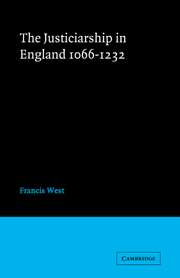Book contents
- Frontmatter
- Contents
- List of Abbreviations
- Introduction
- I THE ORIGINS OF THE JUSTICIARSHIP
- II THE JUSTICIARSHIP UNDER HENRY II
- III THE JUSTICIARSHIP UNDER RICHARD I
- IV THE JUSTICIARSHIP UNDER JOHN: BEFORE THE LOSS OF NORMANDY
- V THE JUSTICIARSHIP UNDER JOHN: AFTER THE LOSS OF NORMANDY
- VI THE JUSTICIARSHIP IN JOHN'S LAST YEARS
- VII THE JUSTICIARSHIP UNDER HENRY III
- Bibliography
- Index
IV - THE JUSTICIARSHIP UNDER JOHN: BEFORE THE LOSS OF NORMANDY
Published online by Cambridge University Press: 08 January 2010
- Frontmatter
- Contents
- List of Abbreviations
- Introduction
- I THE ORIGINS OF THE JUSTICIARSHIP
- II THE JUSTICIARSHIP UNDER HENRY II
- III THE JUSTICIARSHIP UNDER RICHARD I
- IV THE JUSTICIARSHIP UNDER JOHN: BEFORE THE LOSS OF NORMANDY
- V THE JUSTICIARSHIP UNDER JOHN: AFTER THE LOSS OF NORMANDY
- VI THE JUSTICIARSHIP IN JOHN'S LAST YEARS
- VII THE JUSTICIARSHIP UNDER HENRY III
- Bibliography
- Index
Summary
King John had much more in common with his father Henry II than with his brother Richard. He had been an English magnate and was familiar with the country and its people, and they with him; indeed this knowledge may very well have been decisive for his succession instead of Arthur's. He had the same sustained interest in government and its workings as Henry, and, unlike Richard, he actively intervened in its details. The person of the king therefore circumscribed his justiciar as Hubert Walter had not been circumscribed by Richard. Moreover, John's first justiciar probably had not the personal greatness of Archbishop Hubert and certainly not his combination of powerful offices. Hubert himself took the chancery at the beginning of John's reign, and even if that office did not give him authority beside the justiciar his other offices and his great prestige as ex-justiciar certainly complicated Geoffrey fitz Peter's own position. Apart from references to Hubert's former authority or present knowledge in the rolls of exchequer and bench, one incident alone reveals his importance. Perhaps in March 1202 Geoffrey fitz Peter was with the archbishop and the king in Normandy, and he remained abroad until early May. On 11 May Hubert Walter was sent to the justiciar and the justices in England whom John ordered to accept without question the things Hubert would tell them and to summon him to all their discussions, adding that he would ‘hold firm and established that which you decree with his counsel touching the furtherance of our business’. The justiciar was thus limited in deciding policy and practice, but within these limits his was the authority that moved government.
- Type
- Chapter
- Information
- Justiceship England 1066–1232 , pp. 97 - 124Publisher: Cambridge University PressPrint publication year: 1966



